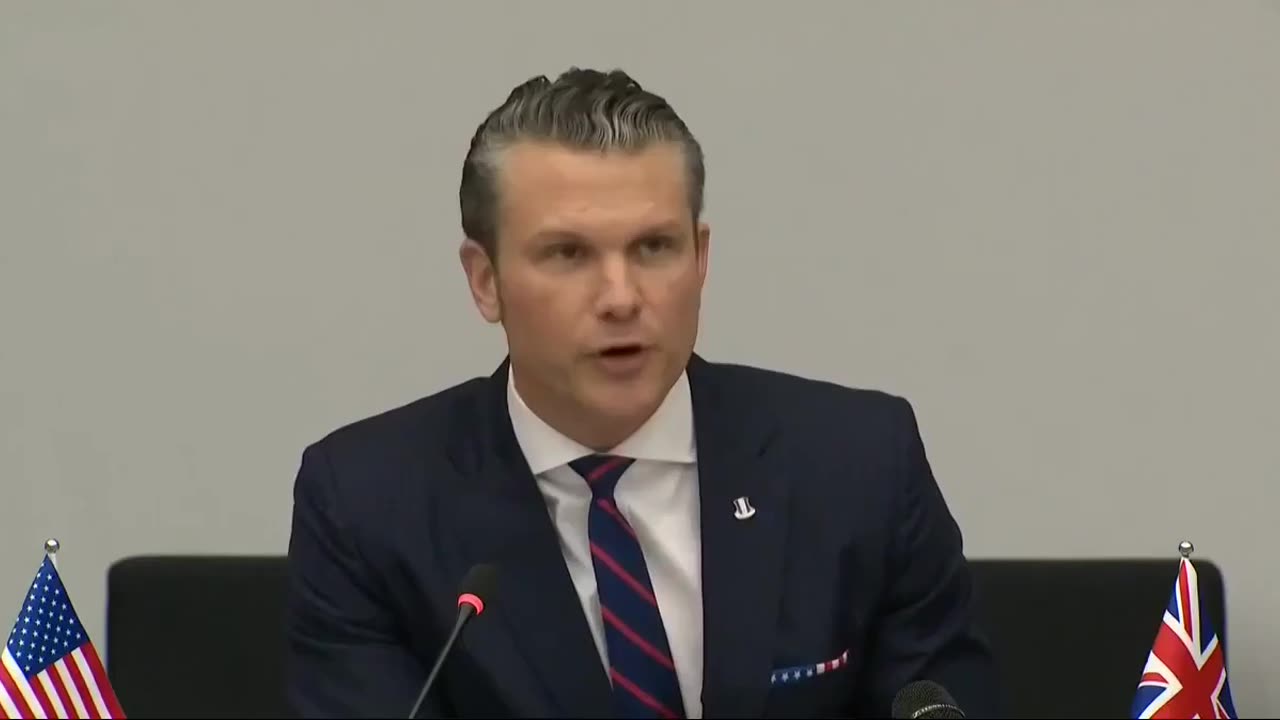Premium Only Content

United States says Ukraine will NOT join NATO & US troops will NOT be deployed to Ukraine.
US Rules Out Ukraine NATO Membership, Won't Deploy Troops Amid Policy Shift
U.S. Secretary of Defense Pete Hegseth stated on Wednesday that the ongoing conflict between Ukraine and Russia "must end," emphasizing that Ukraine joining NATO is unrealistic. Hegseth also signaled a strategic shift in U.S. foreign policy under the Trump administration, with a greater focus on securing U.S. borders and deterring conflict with China rather than prioritizing European and Ukrainian security.
"We hear your concerns on stepping up for Ukraine, and we hear your concerns on stepping up for European security," said UK Defense Secretary John Healey in response. "We are and we will."
UK Takes a Leading Role in Ukraine Support
The UK appears to be stepping into a leadership role in supporting Ukraine. On Wednesday, the UK chaired the Ukraine Defense Contact Group meeting for the first time, a role traditionally dominated by the U.S. Ukrainian Defense Minister Rustem Umerov released an extensive statement following his meeting with Healey, accompanied by a photograph of the two shaking hands. In contrast, his meeting with Hegseth was described in a single sentence and featured a more reserved photo of the two officials standing side by side.
NATO Secretary General Mark Rutte acknowledged the shift in U.S. priorities, stating that while he agreed with President Donald Trump's call for allies to contribute more to Ukraine's defense, greater efforts were still needed to change the course of the conflict.
US Policy Shift: Less Involvement, More Burden on Allies
Hegseth's remarks provided the clearest indication yet of the Trump administration's intention to reduce U.S. involvement in European security matters. He reinforced calls for NATO allies to increase their defense spending to 5% of their GDP, rather than the current 2%, arguing that the existing level of contribution is "not enough."
Despite the policy shift, Hegseth maintained that the U.S. remains committed to NATO, stating, "Full stop. But the United States will no longer tolerate an imbalanced relationship which encourages dependency." A European defense official later noted a sense of relief that the U.S. is not planning to withdraw from NATO entirely, leaving room for negotiations on future security commitments.
Uncertainty Over Future Military Aid
While the U.S. has not halted military aid to Ukraine from previously approved aid packages, the future of additional support remains uncertain. Hegseth did not indicate whether the U.S. would continue drawing from its own military stockpiles for Ukraine, a process known as Presidential Drawdown Authority. The Department of Defense has yet to allocate the nearly $4 billion in leftover congressionally approved funds from the previous administration.
Ukraine's NATO Prospects and Security Guarantees
Hegseth made it clear that NATO membership for Ukraine is "not a realistic outcome" of a negotiated settlement with Russia. He emphasized that any security guarantees for Ukraine must be upheld by European and non-European forces, ruling out U.S. troop deployment.
“The United States does not believe that NATO membership for Ukraine is a realistic outcome of a negotiated settlement," he stated. "To be clear, as part of any security guarantee, there will not be U.S. troops deployed to Ukraine."
Additionally, he dismissed the idea of Ukraine reclaiming its pre-2014 borders, suggesting that such an objective is unrealistic. This stance aligns with the views of some NATO allies, though Ukrainian President Volodymyr Zelensky has continued to insist that NATO membership is the only way to deter future Russian aggression.
Reactions from NATO and European Officials
Some European officials expressed concern over Hegseth's remarks, particularly regarding the shift in U.S. security priorities. A European defense official noted that while NATO members generally acknowledge Ukraine's NATO membership is unlikely, they avoid stating it publicly to prevent giving Russia leverage over the alliance's expansion policies.
Former Biden administration officials were quick to criticize the policy shift, with former State Department spokesman Matthew Miller stating on social media that the U.S. had "surrendered one of the main points of leverage before negotiations even begin."
Hegseth's remarks underscore a significant shift in U.S. foreign policy under the Trump administration, moving away from direct involvement in European security issues and placing greater responsibility on NATO allies.
As the UK takes on a more prominent role in supporting Ukraine, European nations will likely need to reassess their commitments to regional security in light of the changing U.S. stance.
-
 1:08:48
1:08:48
Winston Marshall
23 hours agoThe Damaged Generation: How Lockdown Damaged 50 Million Children For Life with David Zweig
25.2K37 -
 LIVE
LIVE
Eternal_Spartan
3 hours agoLive at 11am Central!! | Clari Obscur Expedition 33 - Possibly the Best Game of My Life?!?
142 watching -
 13:05
13:05
Cowboy Kent Rollins
23 hours ago $7.87 earnedHomemade Cowboy Corn Dogs | Easy Corndog Recipe
22K20 -
 LIVE
LIVE
GritsGG
3 hours ago#1 Warzone Win Grind! 🔥
51 watching -
 8:24
8:24
Talk Nerdy Sports - The Ultimate Sports Betting Podcast
3 hours ago4/26/25 - Saturday Annihilation: Vasil’s 8 Sharp Picks and 2 PrizePicks Built for Blood 💥📈
26.8K1 -
 LIVE
LIVE
GamingWithHemp
2 hours agoElder Scrolls Oblivion Remastered Episode #2 Ultra high settings
50 watching -
 2:11:49
2:11:49
Rotella Games
21 hours agoSaturday Morning Family Friendly Fortnite
12.9K5 -
 2:13:45
2:13:45
I_Came_With_Fire_Podcast
11 hours agoRESTRUCTURING THE WORLD- CIVICS CLASS WITH DAN HOLLAWAY
17.6K5 -
 DVR
DVR
Bannons War Room
2 months agoWarRoom Live
14.2M3.58K -
 LIVE
LIVE
Total Horse Channel
1 day agoYELLOWSTONE SLIDE I | SATURDAY
232 watching